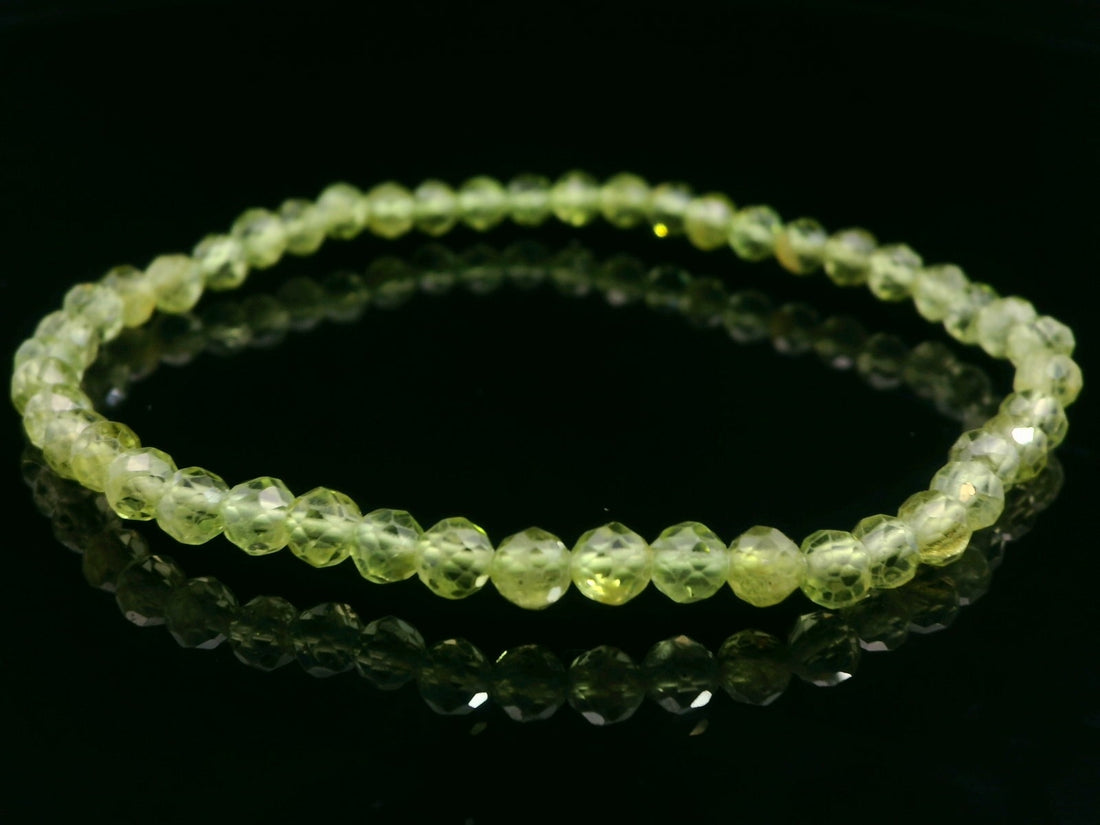Peridot 4mm Faceted Bracelet
Abundance, Adventure, Alignment
Chakra: Solar Plexus, Heart
Birthstone: Leo, Virgo, Scorpio, Sagittarius
Colour: Green, yellow, brown
Oils/Herbs: Cinnamon, Bergamot, Patchouli, Jasmine
Peridot is the gem variety of Olivine, which is a Silicate mineral. Silicate minerals form the largest family of minerals, including more than 25% of all known minerals and 40% of all common minerals. In addition to being a major part of the Earth’s crust, Silicate minerals have also been found on the moon and in meteorites.
All Peridots on the market may be considered fully natural, enhanced only by tumbling, cutting, and polishing. They are one of the few precious or semi-precious gemstones that this is true of. Most Peridots are tiny, with very few large specimens ever discovered.
Metaphysical & Healing Properties
Known as the stone of prosperity and abundance, this stone helps one recognise the value of life in all its myriad of degrees. Whether its financial or spiritual wealth, Peridot helps one to break down the barriers holding us back from reaching our full potential.
Peridot helps us to better attune to nature and the fairy and devic realms.
It’s a joyful stone, encouraging one’s inner child and be comfortable with playfulness and expression of joy. It reminds us that its good to be able to not only give but also to receive and this allows us to ‘receive’ or be more open to all that is naturally on offer to us. This stone reminds us that we all deserve happiness and that our choices determine our experience of reality.
On a mental level, Peridot helps us explore new ideas and to be open-minded, gracious and open hearted. We are more readily able to attract those who are also open minded and open hearted, leading to better relationships.
Peridot has been traditionally used for assisting depression, anxiety, and chemical addictions. It’s also beneficial when used in an elixir, to help strengthen the body in general.
Harmonizes/Combines with Aventurine, Jade, Green Apatite, Green Tourmaline, Chrysoprase, Prehnite and yellow or green Hiddenite.
History
Peridot has one of the oldest and most detailed historical traditions of any healing stone. It is included in virtually every known lapidary, texts which describe gemstones and their powers. Some of the most ancient traditions concerning Peridot date back to the very dawn of civilisation.
This stone has been called a variety of names, including: Olivine, Chrysolite, Evening Emerald, Forsterite, Fayalite, and Peridotite – which has caused some confusion over the years. Forsterite and Fayalite are actually closely related to Peridot, but are distinct minerals. Evening Emerald is a trade name which was once used to sell more stones, but has since fallen out of favour. The other three names are more accurate. Peridot is the name used by geologists and gemologists to refer to the gem-variety of the mineral Olivine. Geologists use the term Peridotite to refer to an olivine-rich stone. For the purpose of most collectors and those interested in crystal healing, the name Peridot is the most useful. Its name comes from the French peritot, whose precise meaning is unknown.
Nowadays, most people think of Peridot as a green or lime green stone. However, it can also appear bright golden yellow. These yellow Peridots have been linked to the sun since ancient times. This golden colour also accounts for the long association between Peridot and prosperity.
Disclaimer
Crystal properties are listed for information purposes only and are not intended to replace medical advice. Always consult a physician for proper medical treatment.
Due to the natural formation of this gemstone, slight variation in gemstone and colour are to be expected.

